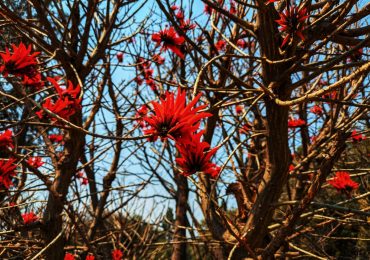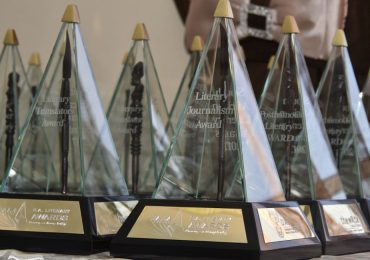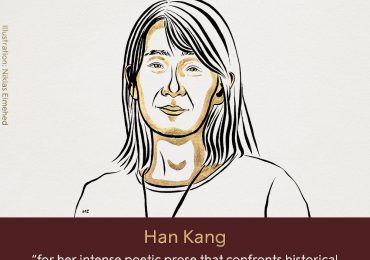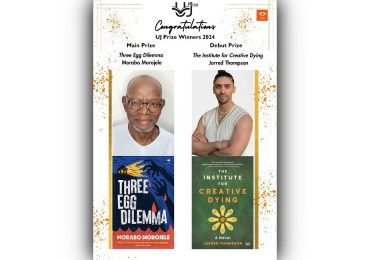The shortlists for the 2020 Humanities and Social Sciences Awards (HSS Awards) have been announced.
The awards, now in their fifth year, are open to South African publishers, scholars based in South African universities and independent artists linked to universities, and come with R65,000 prize money per winning entry.
The awards honour ‘outstanding, innovative and socially responsive scholarship, creative as well as digital contributions that enhance and advance fields in the humanities and social sciences’ and ‘recognise and celebrate those members of the Humanities and Social Sciences community who are undertaking the necessary work of creating post-apartheid and postcolonial forms of scholarship, creative production, and digital humanities outputs’.
The call for submissions for this year’s awards attracted more than one hundred entries from across the country.
The awards ceremony will take place on 12 March 2020 at Constitution Hill in Johannesburg.
2020 HSS Awards shortlist—Books: Non-fiction
- A Political Biography of Selby Msimang: Principle and Pragmatism in the Liberation Struggle by Sibongiseni Mkhize, HSRC Press
- Black Academic Voices: The South African Experience by Grace Khunou, Hugo Canham, Katijah Khoza-Shangase and Edith Dinong Phaswana, HSRC Press
- Contemporary Live Art in South Africa: Pragmatism in the Liberation Struggle by Jay Pather and Catherine Boulle, Wits University Press
- Civilising Grass: The Art of the Lawn on the South African Highveld by Jonathan Cane, Wits University Press
- Dance of the Dung Beetles: Their Role in the Changing World by Marcus Byrne and Helen Lunn, Wits University Press
- Sol Plaatje: A Life of Solomon Tshekisho Plaatje 1876–1932 by Brian Willan, Jacana Media
- Transforming Research Methods in the Social Sciences: Case Studies from South Africa by Sumaya Laher, Angelo Fynn and Sherianne Kramer, Wits University Press
- Writing the Ancestral River: A Biography of the Kowie by Jacklyn Cock, Wits University Press
2020 HSS Awards shortlist—Books: Fiction
- A Tree for the Birds by Vernon RL Head, Jacana Media
- Called to Song by Kharnita Mohamed, Kwela
- Lacuna by Fiona Snyckers, Pan Macmillan SA
- The History of Intimacy by Gabeba Baderoon, Kwela
2020 HSS Awards shortlist—Creative Collections and Digital Contributions
- Asymmetries Exhibition by Nduka Mntambo
- Azimuth: An Experiment of Virtual Reality for the Fashion Film Genre by Nirma Dolly Madhoo
- Institute for Creative Arts (ICA) Live Art Festival by Jay Pather
- Liminal by Reza Khota
- Songs of Greeting, Healing and Heritage by Mantombi Matotiyana
- Oxford Digital Thematic Atlas series by Elaine Williams
- There’s No Disappointment in Heaven by Kgomotso Moshugi
- The Tree Song by Kristina Helena Johnstone
- The Chronicles of Sketch and Etha by Gregory Koole
- Speaking Through Walls by Sethembile Msezane
- Yet to be Determined by Gavin Krastin
Press release:
Achieving the litmus test of social relevance
The call for submissions for the 2020 Humanities and Social Sciences Awards: Book, Creative Collection and Digital Contribution (HSS Awards) has attracted more than 100 entries from creatives across the country within the humanities and social sciences (HSS) disciplines.
The fifth installation of the annual HSS Awards, which will take place on March 12 this year at Constitution Hill in Johannesburg, will honour scholarly works based on their social relevance and contribution to the humanities and social sciences.
The awards categories include fiction (novel, as well as poetry and short stories), non-fiction (monograph, edited volume), creative collections (musical compositions/arrangements, public performances, visual arts), as well as digital humanities, visualisations and infographics. This year’s qualifying entries feature 67 book entries and 18 creative collections and digital contributions.
As the host of the awards, the National Institute for the Humanities and Social Sciences (NIHSS) is pleased with the expansive contribution of submissions. The chief executive of the NIHSS, Professor Sarah Mosoetsa, expressed her appreciation of the ‘focus by the [entrees] to motivate their work’; she notes that the submissions indicated that ‘[the creatives] take their work and their contribution to the humanities seriously’.
‘We are pleased to note the phenomenal growth and interest in the HSS Awards over the years as we celebrate the fifth golden year of the awards and the NIHSS,’ she said.
A non-fiction collection that challenges the status quo of higher education institutions
Mosoetsa noted a gradual increase in the biographical submissions for the awards over the past two years, and this upsurge has started a welcome conversation among the judges on biographies as one of the subcategories. ‘This development sees growing interest in biographies, proving that it is always interesting to read about people who have made an impact on our history, and that South Africans should read this genre to learn more about what it took to have the democracy that we all enjoy today.’
This year’s literature in the non-fiction category was hailed for challenging the status quo of higher education institutions in terms of the demographic representation, in addition to such spaces being perceived as the only primary sources of knowledge and research production. Decolonisation of knowledge and art and the intersectional nature of black and African lived experiences continue as prevailing themes.
Acts of Transgression: Contemporary Live Art in South Africa by Jay Pather and Catherine Boulle (Wits University Press) captures the feelings and complexities of democratic South African society and shifts that the country has experienced with the passage of time. The judges noted the book’s demonstration of live art as more than just experiential, rather highlighting art as a tool and methodology of furthering social justice.
Among those entries that depict the lived experiences of Africans, Black Academic Voices: The South African Experience by Grace Khunou, Hugo Canham, Katijah Khoza-Shangase and Edith Dinong Phaswana (HSRC Press) is hailed for its contribution to the HSS. It is a biographical rendition of black academic experiences in South African institutions that focuses on the experiences of black women in previously white institutions. Its notable theme of racialised and gendered bias and discrimination warns of possible dire consequences for academia.
Sumaya Laher, Angelo Fynn and Sherianne Kramer’s edition of Transforming Research Methods in the Social Sciences (Wits University Press) is noted for its identification of improving access to research resources as a necessity and as a means of capacitating research in the Global South.
Plaatje: A Life of Solomon Tshekisho Plaatje (1876–1932) (Jacana Media) by Brian Willan and A Political Biography of Selby Msimang: Principle and Pragmatism in the Liberation Struggle (HSRC Press) describe the lives of two important men in the history of South Africa.
A Political Biography of Selby Msimang by Sibongiseni Mkhize captures new knowledge and decolonises history from Msimang’s perspective. The biography sheds new light by describing the contradictions of the politics and personal life of a man who witnessed more than 70 years of the country’s history and had an influence on the period himself. Willan’s rendition of Plaatje’s life is an apt reflection of the sociopolitical times that Plaatje lived through. Relating the political hero’s life as more than just a set of occupational and personal roles, it also encompasses Plaatje’s interpretation of Shakespeare’s work into Setswana and is a fitting synthesis of new academic developments based upon Plaatje’s life.
Wits University Press’s Writing the Ancestral River: A Biography of the Kowie (Jacklyn Cock), Dance of the Dung Beetles: Their Role in our Changing World (Marcus Byrne and Helen Lunn), and Civilising Grass: The Art of the Lawn on the South African Highveld (Jonathan Cane) respectively focus on the Kowie River, dung beetles and lawns. They weave together the intersectional landscapes of history, literature, ecology and more in intriguing and insightful ways.
A fictional range of identity, ethics, social issues and poetry
This year’s collection of fiction covers topics that include identity, ethics, social issues and poetry.
Called to Song (Kwela) is Kharnita Mohamed’s fictional depiction that is based on real-life experiences on the Western Cape’s Cape Flats. A poetic and lyrical rendition of the lifestyle and experiences of coloured Muslims in apartheid South Africa, the book explores relevant themes such as gender, masculinity, culture and identity that are currently in discussion at both high schools and tertiary institutions.
Fiona Snyckers’s Lacuna (Pan Macmillan SA) takes to task an existing novel (Disgrace by JM Coetzee), whose themes are established from a gang-rape incident. Here the author creatively challenges the writer of Disgrace as well as its readers to answer the question of who can tell whose story and make a profit from it. A Tree for the Birds by Vernon RL Head (Jacana Media) is described as ‘a rare literary work [whose] story is a reading adventure dipping into global environmental issues’. The novel’s intricately and poetic style sheds light on communities impacted by capitalism and the plundering of African countries.
The History of Intimacy by Gabeba Baderoon (Kwela) is an illustration of South Africa’s many personalities, histories, present conflicts and future anxieties, all beautifully layered in a smorgasbord of poetic reflections.
Inspiring creative and digital collections, contributing to ongoing discourse on freedom
This year’s creative collections and digital contributions category comprises an impressive collection. Liminal – Reza Khota is a guitar-led instrumental by an ensemble that features a saxophone, bass, and drums and is hailed as a musical contribution ‘that will stand the test of time’. Mantombi Matotiyana’s Songs of Greeting, Healing and Heritage reflects multi-disciplinary engagement with the international icon’s work. There’s No Disappointment in Heaven by Kgomotso Moshugi is a composition of American Protestant ‘historical repertoire’ popularised in South Africa during the 20th century.
Among the interesting collection there are live performances such as The Institute for Creative Arts (ICA) Live Art Festival 2018 by Jay Pather, Yet to be Determined by Gavin Krastin, and The Tree Song by Kristina Helena Johnston. Nduka Mntambo’s Asymmetries is a relevant, topical, thought-provoking stance on African urbanity. Multiplicity is echoed in multiple voices and the imagery of the city from African perspectives, contributing to an ongoing discourse on freedom and how it looks from an African perspective. Speaking Through Walls by Sethembile Msezane addresses contemporary issues such as land reform and her position as a black woman. This work reads as a document of current issues without presuming the outcomes, but acknowledging the necessity of where we currently are within the lens of social, historical, traditional and contemporary ideas.
The Chronicles of Sketch and Etha, the Oxford Digital Thematic Atlas series, and Azimutha: An Experiment of Virtual Reality for the Fashion Film Genre are creative digital works produced by Gregory Koole, Elaine Williams, and Nirma Dolly Madhoo respectively. The Chronicles of Sketch and Etha is garnering acclaim as a well written novel with great illustrations, and Oxford’s digital atlas is commended for its contribution to the facilitation of education.
Once again, the Humanities and Social Sciences Awards 2020 live up to the expectation of bringing together a cluster of impactful and insightful literary and creative works that are truly worthy of recognition. —Anele Ngcoya
Ends





